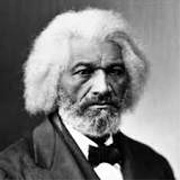FREDERICK DOUGLASS
 Frederick Douglass |
| Frederick Douglass was a leading Black abolitionist who had first hand knowledge of the indignities of slavery. He immediately understood the essence of the war from its beginning. He stated: �The American people and the Government at Washington may refuse to recognize it for a time, but the inexorable logic of events will force it upon them in the end; that the war now being waged in this land is a war for and against slavery; and that it can never be effectually put down till one or the other of these vital forces is completely destroyed.� Douglass viewed the war as a means for the Black man to advance to the ranks of the military and then to the ranks of citizenship. A few months later Douglass led the charge for the use of the mobilization of the Blacks into soldier-hood. �This is no time to fight only with your white hand and allow your black hand to remain tied�Men in earnest don�t fight with one hand, when they might fight with two, and a man drowning would not refuse to be saved even by a colored man.� The war�s brutality and longevity gave all in the North a change of mind, and a change of heart, which forced them to see the war from a different viewpoint. This new vision was shared and perpetrated by Lincoln and leading members of Congress. People no longer saw the war from a legal perspective but a moral one. This changing view point was brought about by the reality that comes from defeat. Union armies had been defeated with repetition by Confederate forces operating in the major theater of Virginia. Over the period that these defeats were taking place the mind set of the North began to change more with each defeat. It became clear that a new approach would have to be under taken if the Union was to survive. The emphasis now turned to destroying the Confederates economic system. Since the Union could not beat the Confederate�s army into submission therefore forcing them back into the Union, they would do so by destroying their economic system to achieve re-unification. And the economic system of the Confederacy was slavery. Lincoln, although finding slavery appalling, had stated that if he could preserve the Union by freeing all of the slaves he would do so; and if he could preserve the Union by freeing none of the slaves he would do so; or if he could preserve the Union by freeing some and leaving others in bondage he would do that. Events now made it clear that the only way to preserve the Union was through the abolishment of slavery. The continuing defeats of the Union army in Virginia had planted the seeds of this policy change and Lincoln was prepared to put this new policy into effect. He did so by writing the Emancipation Proclamation. Although he was prepared to issue it upon his completion of the document, he was encouraged not to do so until a Union victory was achieved over Robert E. Lee�s army. This victory came in the battle of Antietam. This was not a decisive victory for the Union but a tactical one. At least it was good enough to put forth his Emancipation Proclamation. The irony of the document was that it didn�t free one single slave. It was to free the slaves in any State that was in rebellion in three months. Furthermore, he did not free any slaves in States where he had to power to do so. These were States that were under Union control. This was because he did not wish to anger any State that might join in the succession by his emancipation policies. There were referred to as �Border States.� The prediction of Douglass had born fruit: "events had shown that the war was a war against slavery." The limited emancipation would turn into full emancipation and that would bring about the employment of the Black Civil War soldier who would help make possible the Union victory. Then, as he also predicted, propel Blacks into full citizenship. �Once let the black man get upon his person the brass letter �US� let him get an eagle on his button and a musket on his shoulder and bullets in his pockets and there is no power on earth which can deny that he has earned the right to citizenship in the United States.� A point of note. When Douglass arrived in New Bedford, Massachusetts he was advised to change his name. He was reluctant to do so but saw the wisdom in it. The abolitionist advised him to take on the name Douglas. To show his displeasure with the name he added another �s� to the name. Therefore Douglas became Douglass. |